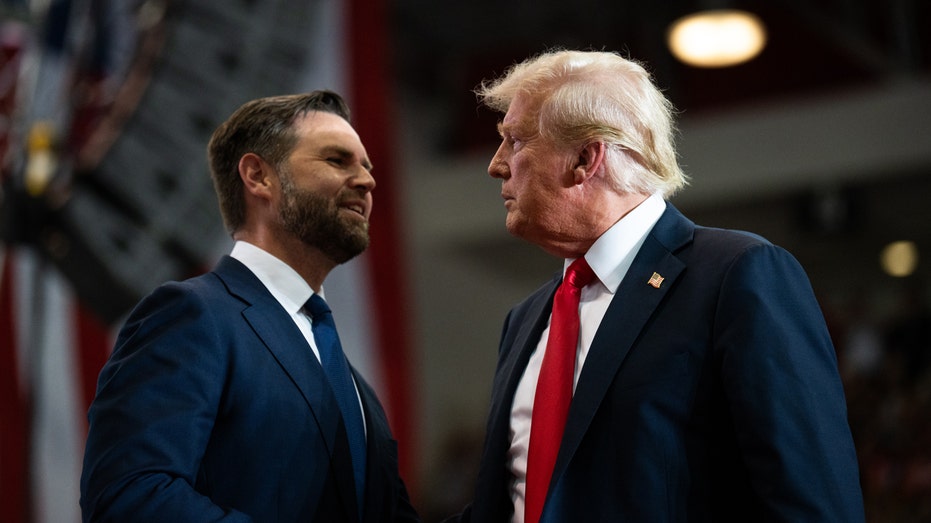
Biden-era regulations can be expected to be on the chopping block via legal challenges once President-elect Donald Trump takes office, experts say.
Experts expect President-elect Donald Trump to take aim at federal agencies and Biden-era regulations after campaigning on deregulation of the administrative state.
“The first thing is that on day one of [Trump’s] presidency, we’ll see a lot of executive orders, which will order agencies to review the administration regulations to determine whether they should be retained, amended or repealed,” Robert Glicksman, J.B. and Maurice C. Shapiro Professor of Environmental Law at George Washington University Law School, told Fox News Digital.
Mark Chenoweth, president of the New Civil Liberties Alliance, particularly pointed to Biden-era regulations, saying they could be on the chopping block once Trump takes office, telling Fox News Digital, “the Biden administration did a lot of things that lacked statutory authority completely.”
‘EFFICIENT AND ACCOUNTABLE’: GOP-LED DOGE BILL AIMS TO SLASH OUTFLOW OF FEDERAL DOLLARS
Chenoweth noted that the Biden administration has already been the target of lawsuits over its regulations and said that if Trump were to take those regulations on, “I think they’ll enjoy a lot of success.”
Trump has already been vocal about his intentions of cutting back on federal agency power and slashing the flow of federal dollars. The president-elect has also announced he has tapped Elon Musk and Vivek Ramaswamy to head the Department of Government Efficiency (DOGE).
The entity will act as an advisory panel, not a government agency, and will be aimed at suggesting ways to dismantle government bureaucracy and restructure federal agencies in order to save costs and improve efficiency, according to Trump’s transition team.
Regarding DOGE, Glicksman stated the Trump administration will “certainly take seriously” DOGE’s guidance on “cutting back on regulations, streamlining executive agencies, possibly even eliminating some agencies.”
Both Chenoweth and Glicksman said they can foresee labor regulations becoming a target come January. Glicksman said climate change and environmental regulations could also come under fire.
“In the labor area, because [the Biden administration has] been so radical, they really reached well beyond what the statutory authority that was given to NLRB or the Department of Labor with a lot of what they’ve done. So that’s one area that I could foresee,” Chenoweth said.
Likewise, the U.S. Supreme Court ruled to overturn the Chevron doctrine in June of this year in its Loper Bright decision. The doctrine previously gave deference to an agency’s interpretation of a federal regulation. In its holding, the Supreme Court effectively scaled back administrative power in holding that “Courts must exercise their independent judgment in deciding whether an agency has acted within its statutory authority.”
Chenoweth, whose organization litigated on the matter, applauded the Loper Bright ruling, saying it “goes back to empowering Congress rather than the administrative agencies.”
“For the last 40 years, the administrative state has been burgeoning because of this ability to, kind of, write law and create law itself when there’s a gap or ambiguity in the statute,” Chenoweth said. “Now, they’re not going to able to do that so much. And so it’s going to throw it back to Congress if we need to have reform in an area or new legislation.”
Glicksman, however, said Loper Bright could “boomerang” on the Trump administration instead.
“Had Chevron remained in effect, it would be Trump administration initiatives that would get the benefit of Chevron deference, but that’s no longer the case,” Glicksman said. “And so it’s possible that courts will look more rigorously or apply greater scrutiny to Trump administration initiatives in administrative law issues in administrative ones than they would have done had Loper Bright not been decided.”
Glicksman said he can foresee Republican-led legal challenges to later Biden-era actions unfolding specifically in the Fifth Circuit Court of Appeals, which notably tends to lean conservative in its rulings. Likewise, Glicksman predicts Democrat-led challenges to appear in the Ninth and D.C. Circuits.
“I think you’ll see blue states led by California challenging those regulations, starting off probably in the Ninth Circuit and the D.C. Circuit, which are more friendly to agency authority than the Fifth Circuit and some other circuits. So you’ll see a skewing of litigation,” Glicksman said.
Chenoweth stated that because so many Biden-era regulations “are so lacking in authority,” the circuit in which the lawsuit is started may very well not make much of a difference.



